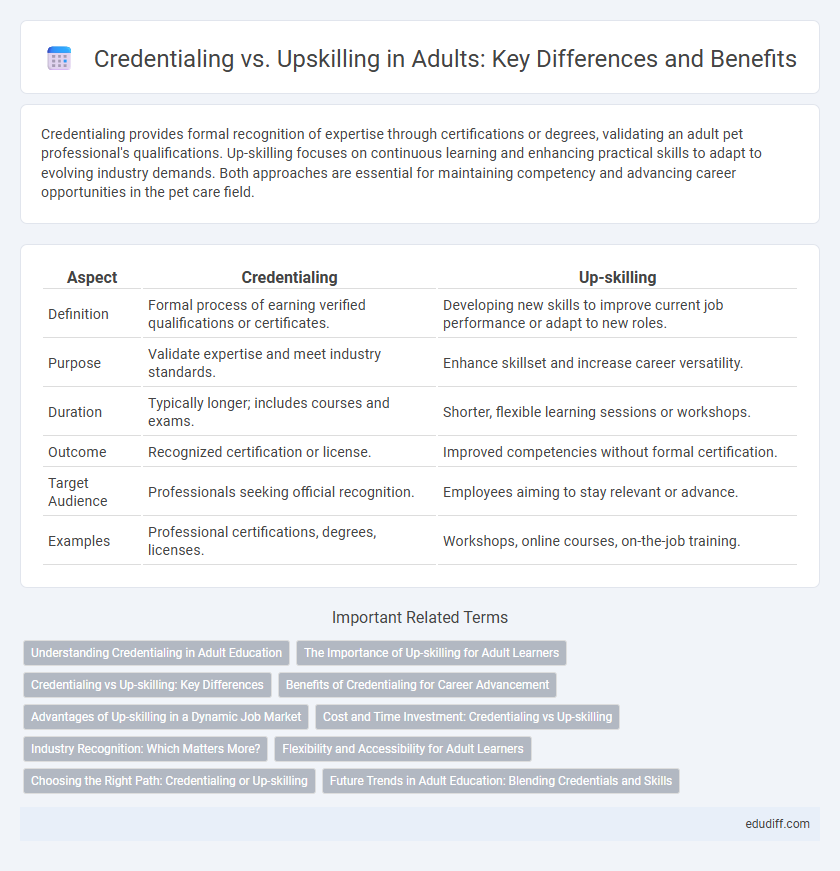Credentialing provides formal recognition of expertise through certifications or degrees, validating an adult pet professional's qualifications. Up-skilling focuses on continuous learning and enhancing practical skills to adapt to evolving industry demands. Both approaches are essential for maintaining competency and advancing career opportunities in the pet care field.
Table of Comparison
| Aspect | Credentialing | Up-skilling |
|---|---|---|
| Definition | Formal process of earning verified qualifications or certificates. | Developing new skills to improve current job performance or adapt to new roles. |
| Purpose | Validate expertise and meet industry standards. | Enhance skillset and increase career versatility. |
| Duration | Typically longer; includes courses and exams. | Shorter, flexible learning sessions or workshops. |
| Outcome | Recognized certification or license. | Improved competencies without formal certification. |
| Target Audience | Professionals seeking official recognition. | Employees aiming to stay relevant or advance. |
| Examples | Professional certifications, degrees, licenses. | Workshops, online courses, on-the-job training. |
Understanding Credentialing in Adult Education
Credentialing in adult education involves awarding formal recognition through certificates, licenses, or degrees that validate specific skills and knowledge. This structured validation enhances employability and professional advancement by providing tangible proof of competency in targeted fields. Credentialing often aligns with industry standards and regulatory requirements, ensuring relevance and credibility in the job market.
The Importance of Up-skilling for Adult Learners
Up-skilling adults enhances workforce adaptability by equipping them with emerging industry skills, increasing employability and career advancement opportunities. Credentialing validates existing expertise, but continuous up-skilling addresses skill gaps in rapidly evolving job markets. Investing in targeted learning programs boosts adult learners' competitiveness and long-term economic stability.
Credentialing vs Up-skilling: Key Differences
Credentialing validates an adult learner's existing skills through formal certification, while up-skilling focuses on acquiring new skills to enhance job performance or career advancement. Credentialing typically involves standardized assessments and official recognition from accredited bodies, whereas up-skilling may include informal learning, workshops, or online courses aimed at filling specific skill gaps. Understanding these differences helps organizations and individuals strategically invest in workforce development and lifelong learning initiatives.
Benefits of Credentialing for Career Advancement
Credentialing provides verifiable proof of skills and expertise, enhancing credibility and increasing employability in competitive job markets. It often leads to higher salary potential and opens doors to advanced professional opportunities by validating specialized knowledge. Employers prioritize candidates with recognized credentials, accelerating career advancement through demonstrated competence and commitment to continuous professional development.
Advantages of Up-skilling in a Dynamic Job Market
Up-skilling enhances employee adaptability by equipping them with current skills relevant to evolving industry demands, driving sustained career growth. It fosters increased job satisfaction and retention as employees feel valued and empowered to tackle new challenges. Organizations benefit from a more agile workforce capable of innovation and responding swiftly to market changes.
Cost and Time Investment: Credentialing vs Up-skilling
Credentialing typically involves a higher upfront cost and longer time investment due to formal education, examinations, and certification fees. Up-skilling tends to be more flexible and cost-effective, focusing on targeted skill enhancement through workshops or online courses that can be completed more quickly. Organizations often weigh credentialing's comprehensive validation against up-skilling's rapid adaptability when allocating training budgets.
Industry Recognition: Which Matters More?
Industry recognition holds greater weight in credentialing versus up-skilling as it directly validates a professional's qualifications and expertise within the adult education sector. Credentials such as certifications and licenses are formally recognized by employers and regulatory bodies, ensuring standardized competency levels. Up-skilling enhances practical knowledge and adaptability, but without credential recognition, it may lack the authoritative proof required for career advancement.
Flexibility and Accessibility for Adult Learners
Credentialing provides adult learners with recognized qualifications that validate skills, enhancing career prospects through flexible online and part-time programs tailored to busy schedules. Up-skilling offers accessible opportunities for adults to acquire new competencies on-demand via microlearning platforms and self-paced courses that adapt to diverse learning paces. Both approaches prioritize flexibility and accessibility, enabling learners to balance education with work and personal commitments effectively.
Choosing the Right Path: Credentialing or Up-skilling
Choosing between credentialing and up-skilling depends on career goals and industry demands; credentialing offers formal recognition through certifications or licenses, enhancing professional credibility. Up-skilling focuses on developing new competencies and adapting to technological advancements, often through workshops or online courses. Evaluating job market trends and personal growth objectives helps determine whether earning credentials or acquiring new skills will maximize career advancement.
Future Trends in Adult Education: Blending Credentials and Skills
Future trends in adult education emphasize the integration of credentialing and up-skilling to meet evolving workforce demands. Micro-credentials and digital badges are becoming prevalent, offering flexible, skill-specific recognition alongside traditional certifications. Learning platforms increasingly blend formal qualifications with practical skills development, enhancing employability and career advancement.
Credentialing vs Up-skilling Infographic

 edudiff.com
edudiff.com